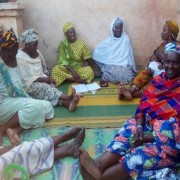Speeches Shim
USAID Mali funds education activities across nine regions of Mali. With $18.5 million in funding in 2018, the education portfolio includes activities to support the government of Mali to ensure children and youth have equitable access to quality, relevant education. Priority goals include: 1) Improved early grade reading outcomes for primary grades; 2) Increased community engagement for more accountability and better learning outcomes; and 3) Increased equitable access to relevant education services for conflict-affected children and youth.
The Health Office manages a $69.3 million portfolio for 2018 to improve the overall health of the Malian population. This portfolio includes activities related to health systems strengthening, maternal and child health, family planning, malaria, HIV/AIDS, nutrition, and water, sanitation, and hygiene – all of which are aligned with the U.S. and Malian governments’ strategic health priorities. These activities, many of which work in collaboration with the Mission’s other offices, seek to increase Malians’ ability to plan, finance, and manage their health system and their own health (at the family, household, community, district, regional, and national levels) to create a healthier population that is resilient and has a prosperous future. USAID-supported health programs are being implemented in 991 health zones in the regions of Sikasso, Kayes, Koulikoro, parts of Mopti and Bamako, and the district of Gao, which together represent about 14.7 million people, or 75 percent of the population.
The Peace, Democracy, and Governance Office manages a $11 million portfolio of complementary programs to address the core peacebuilding and democratic governance needs in Mali. This includes a focus on key U.S. Foreign Assistance priorities such as the Security Governance Initiative; Trans-Sahara Counterterrorism Partnership; Countering Violent Extremism; Women, Peace, and Security; and Trafficking in Persons to advance peace, democracy, and human rights in Mali.

Mali is a deeply patriarchal country. There are many inequalities that adversely affect women and girls, one being prevalent domestic violence. A 2012/2013 USAID Gender Assessment found a vast majority of women in Mali suffering from domestic violence. In fact, the Assessment reported that 76% of women think it is acceptable for a man to beat a woman for burning food, arguing, going out without telling the man, being negligent with children, or refusing to have sexual intercourse. One of the reasons women think this way is because of poor understanding of their legal rights and structural limitations on women’s access to justice.
The U.S. Government, through the United States Agency for International Development (USAID), held a roundtable on December 18 to discuss lessons learned from electoral violence prevention during the 2018 Mali elections. The aim of the activity was to support Malian electoral stakeholders in strengthening their electoral early warning and response systems, and to improve the ability of national and local stakeholders to respond to electoral violence.


Comment
Make a general inquiry or suggest an improvement.